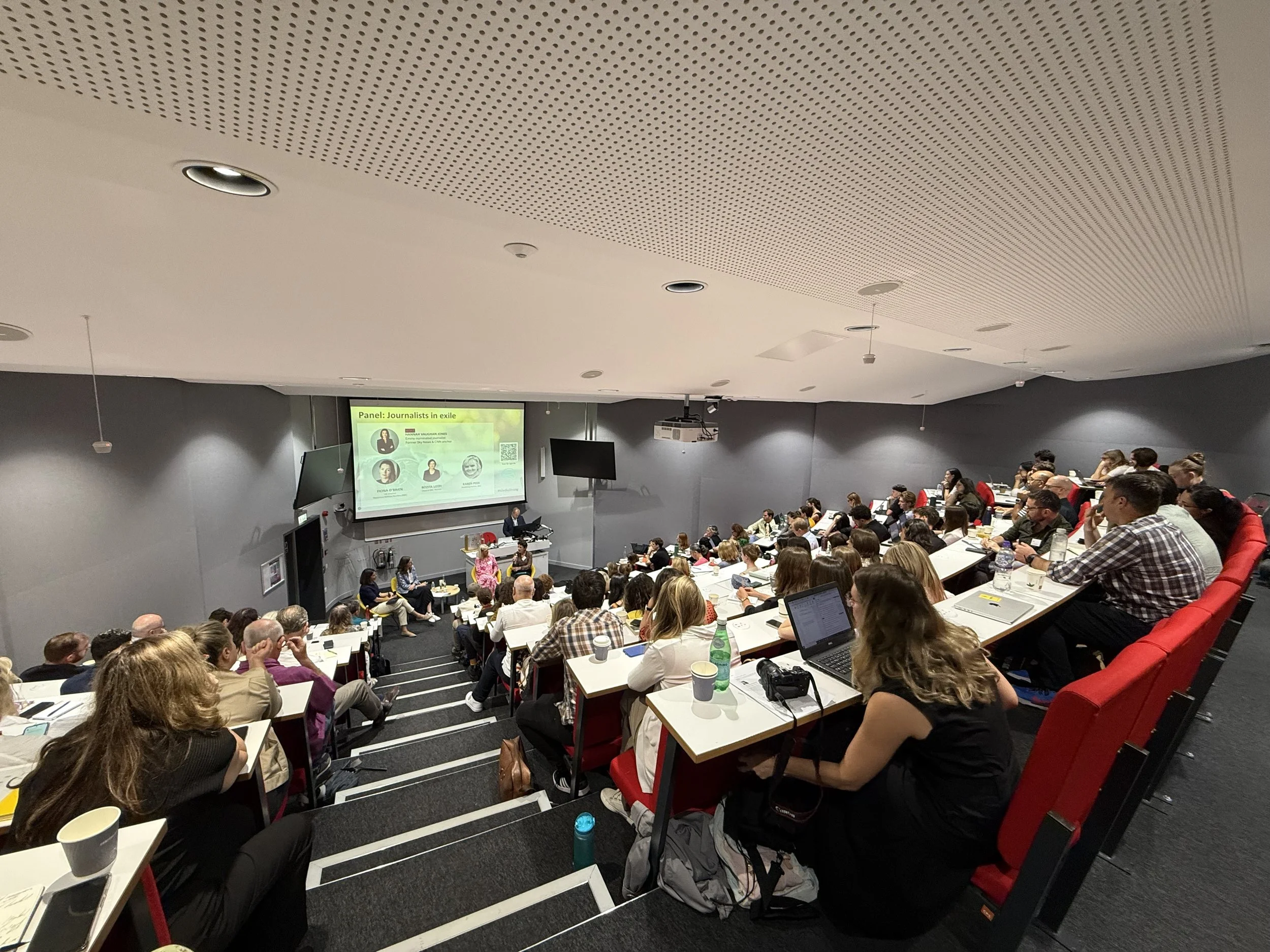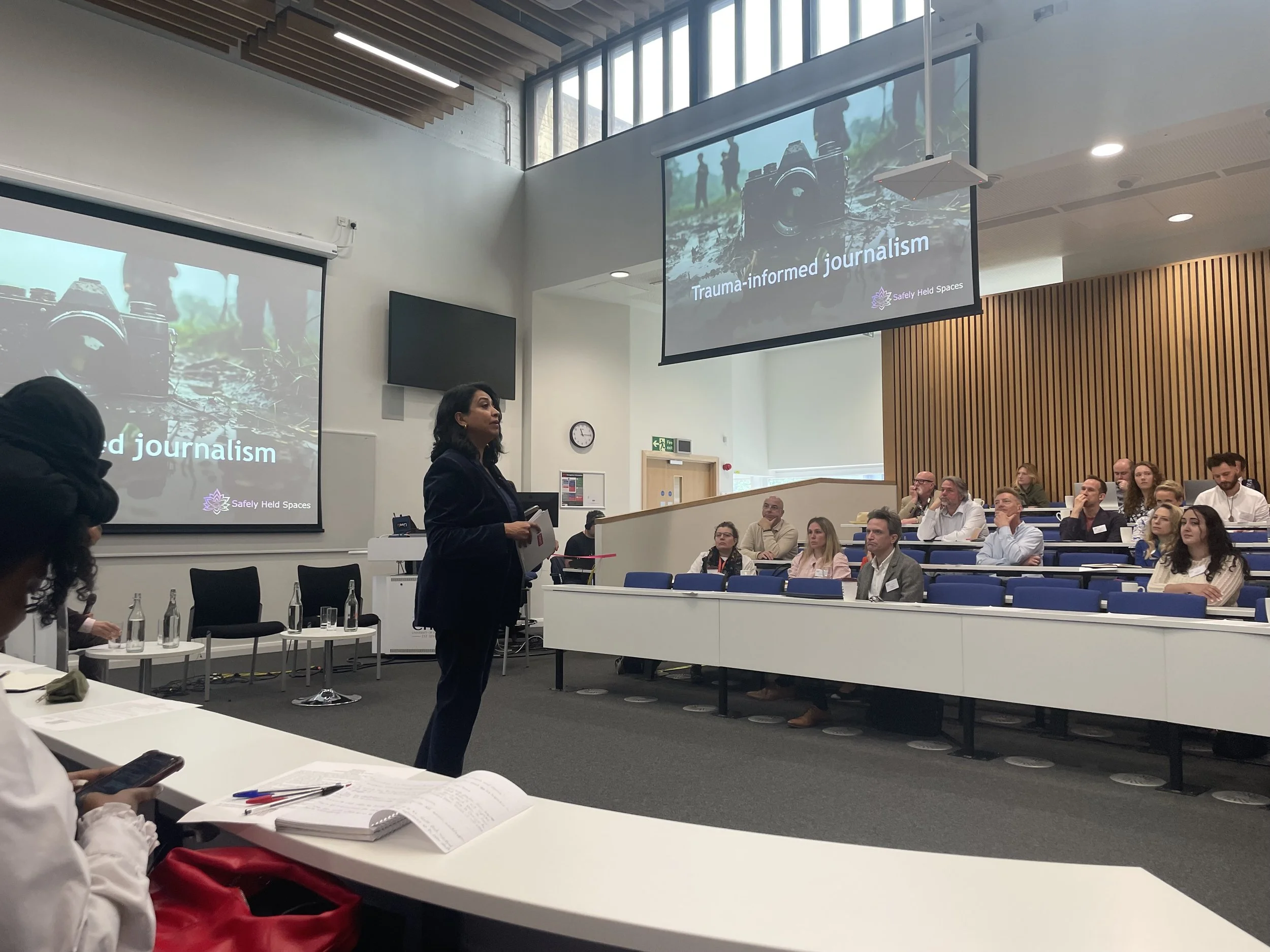Inspired by attending the third – and my second – MediaStrong symposium in early July 2025, I’ve come up with five reasons why I think it’s vital that we talk a great deal more, and much more publicly, about mental wellbeing and journalism.
I’ve reported on traumatic subjects as a journalist for many years now – with my own family history, an important motivating factor in what I choose to report on, putting me in a higher risk category when it comes to the impacts of trauma – and I can see the grinding consequences the work has had on me, and on many colleagues. But we can mitigate these risks and here are the five reasons why I think we must do so urgently.
A full house at the third edition of the #MediaStrong Symposium, hosted at City St George's University in London in July 2025.
1) Brutally, but perhaps most importantly in “selling” the case, it makes commercial and strategic sense. Impactful journalism at the highest level is hard-won and so are the people who make it, the product of years of training and experience, as well as years of building networks and trust. Why burn through and discard those established and experienced and capable people? It’s short-termism in its worst form and as always, prevention is the best – and cheapest – cure.
2) It could not be more timely. So many journalists are under such significant professional and personal pressures, all the time and for years on end, and the mental health consequences are undeniable and there for all of us to see. The industry is in a period of transformation – many would say crisis – and has been for years. Its future form is unclear. Attacks on the media ecosystem, and individual journalists, are at an all-time high. Professional ethical dilemmas are painful and challenging and regular. Financial and job security is at a debilitating low. The news cycle is relentless and the stories often horrific. The consequences of these pressures are real, and I see colleagues suffering all the time. In my experience, they also land particularly heavily on younger journalists and journalists of colour/journalists from less economically or politically powerful contexts, those not in salaried employment, and those working at what some may see as the peripheries of the media ecosystem – but what I see as the frontlines. The local journalists and producers who support international correspondents bouncing into new environments, the junior team members carrying heavy loads who still too often go unacknowledged, the “invisible” fact-checkers and valiant open-source and social media teams poring over the most graphic of content. The people I believe whose experiences we should particularly recognise when it comes to mental health and wellbeing, not least because of the absence of protective cushions afforded by privilege and of how power dynamics skew against them.
Sky News presenter and experienced reporter (and friend!) Saima Mohsin moderates the second MediaStrong conference at City St George's University in London in May 2024.
3) Talking about and protecting the mental health of journalists makes journalism better. Throughout my career, I have non-scientifically observed that some of the very best reporting is done by the most naturally empathic and sensitive of my colleagues. They are also the people who, in my observation, often carry those experiences the most heavily. If we want that important reporting to exist, we must think about how we better protect the people who carry it to us. Protecting the very best journalists, who report ethically and consider how their approach impacts the people who trust those same reporters with often some of the very worst moments of their lives, will by extension make the execution of journalism better. And if you’re not in the industry, one thing you can immediately do to help is pay, pay, pay for everything you read and consume and even what you don’t, as well as donate to journalist assistance organisations (Committee to Protect Journalists, Rory Peck Trust, Reporters sans Frontières – there are plenty more, feel free to ask me). Vote for, and support, good and healthy news with your consumer power.
4) It’s not that difficult to create healthier conditions, in my view. Sure, there are many forces ranged against this – limited budgets, endless time pressures, capacity and bandwidth issues in an ever-more under-resourced industry under duress, internal politics and dynamics (the latter to me is one of the biggest causes of strain and distress that I’ve seen across many of the world’s leading media organisations, often above the distressing reporting itself). But when people, and especially managers, give time and thought to the wellbeing of their teams – at the very least because they realise that it might make for more efficiency and better outcomes – that mindset shift has huge knock-on consequences. If just one person chooses to make space for their colleagues to not be okay, it can change the game. And even though bad behaviour wins out far too much in a very competitive industry, people talk. A lot of different people have said the same thing to me in recent years – I’m fed up of working with arseholes… (and yes, I am too). People do share those stories of bad behaviour, to warn others and to sense-check their own experiences. Toxic internal behaviour shouldn’t be an extra source of avoidable distress in our already pressurised media landscape.
5) And last, but obviously not least, it’s the right thing to do. I was really struck by a comment – one I should have considered more deeply before – made by Leona O’Neill at the third edition of the important #MediaStrong symposium. Leona observed that in other professions where parts of the workforce are exposed to the extremes of humanity – such as lawyers, court staff and counsellors – there are often clear professional pathways, with zero stigma, in place to manage exposure, before and after an interaction with traumatic information or a potentially traumatic experience. Recognition that when you confront the finer, horrific details of cases of child sexual abuse or cover shocking mass-casualty terror attacks or work with the survivors of harrowing incidents of sexual violence (all subjects I’ve personally reported on as a journalist), that after you’ve discharged your professional duties to the best of your ability, and however “tough” you are – and in my experience, journalists are very, very tough – you might also as a human happen to have some feelings. I strongly believe that ours will be much happier, healthier and more efficient industry if we start to acknowledge and find ways to navigate those very human reactions as a central element of the professional process.
Please do look after yourselves – still working on this myself – and look after each other.
A patch of blue in a dark and stormy sky, taken at a very challenging time in my life a few years ago, when I was desperately looking for any kind of sign that things might get better.
If you found this interesting, please consider subscribing to my occasional newsletter via the sign-up box below. I will share my latest work, new pieces of writing and tip off interesting books, films and more – directly with you, rather than via some of the more egregious tech platforms!



